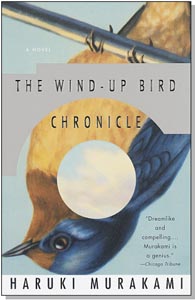![[Metroactive Books]](/books/gifs/books468.gif)
[ Books Index | Metro | Metroactive Central | Archives ]
Deep in Life's Well
 The Wind-Up Bird Chronicle By Haruki Murakami Vintage; 607 pages; $14 paper
In Murakami's world, people must touch bottom before they can find salvation By Jim Rendon TORU OKADA is the ultimate lazy man's hero. He's unemployed and uncertain about his goals, and his greatest achievements take place while he's sitting at the bottom of a well. In one sense, Haruki Murakami's latest novel (which has just been released in a handsome paperback edition) is about getting Okada off his ass. The Wind-Up Bird Chronicle, Japanese writer Murakami's fourth novel to be translated into English, starts with three mysteries. Where's the cat? Where's Mrs. Okada? And who is that strange woman who keeps calling? This trio of mysteries drives the novel through fascinating, bizarre and totally engaging territory. In his effort to track down his wife and his cat, Okada does little more than venture to the mysterious house at the end of the alley, known as the hanging house. Yet in his limited travels, which include a few forays into the rest of Tokyo, Okada manages to draw a carnival of characters to him. There is a fortunetelling war veteran, Okada's media-adored brother-in-law, a psychic healer and a bikini-clad teenage neighbor adrift in the soup of adolescent uncertainty. Weaving stories from Japan's invasion of Manchuria through the nuclear destruction that ended World War II, Murakami draws the high drama and pointless violence of war into the uneventful lives of Japan's latest generation. He paints the horrible crimes during war with the same surrealistic twinges that give all of his work a dreamlike quality. Even at their most horrible, however, these events seem somehow other than real, like a scarring memory that is highlighted by dwelling on the event over and over, impregnating it with a lifetime of meaning. Starting with the war stories of a Lt. Mamiya, the well (the old-fashioned kind big enough to climb into) moves to the center of the story. While Mamiya's near-death experience at the well's bottom leaves him sapped of any desire to live, Okada uses the well to find a doorway into a parallel world. While Mamiya's life is destroyed, Okada finds salvation in the hole in the ground, turning the wartime experience on its head. Okada is the embodiment of disaffected middle-class Japan, a world that Murakami paints as very Western. Early in the book, Okada describes himself: "I am thirty, five-foot-nine, a hundred and forty pounds, short hair, no glasses ... I owned a signed copy of Miles Davis' Sketches of Spain. ... I was out of work. I knew the names of all the brothers Karamozov." Much of the real world is filled with vague interaction, isolated characters, people who are utterly alone. Even the darkly successful brother-in-law is alienated from family and friends. Murakami's strength is that he can immerse the reader in Okada's listless, whimsical world while making the reader itch for the next page. MURAKAMI, 49, has won numerous literary prizes. A Wild Sheep Chase, first published in 1982, brought him Japan's Noma Literary Award for New Writers. Since then he has published The End of the World and the Hard-Boiled Wonderland, Dance Dance Dance and The Elephant Vanishes. Murakami's themes flow from novel to novel. In one book, paper clips become an indispensable item; in another, earlobes are a consuming obsession. In The Wind-Up Bird Chronicle, it is the well that the characters keep returning to. Buried in a hole beneath the earth, they are able to find places within themselves and the universe that transcend the everyday world. Unfortunately, Murakami can't hold his complex narrative together. He strings out a number of entertaining story lines and works with important themes. But the novel gets away from him. Although Okada is finally forced to act decisively, the conclusion is unsatisfying at best. All the high-flying fantasy and big ideas are thrown away in a finale that ignores all but the most basic story liine. A few hundred pages from the back of the book, it is increasingly apparent that the end will fail. But even that creeping knowledge does little to dampen the pleasure of getting there. [ San Jose | Metroactive Central | Archives ]
|
From the December 3-9, 1998 issue of Metro.
Copyright © Metro Publishing Inc. Maintained by Boulevards New Media.